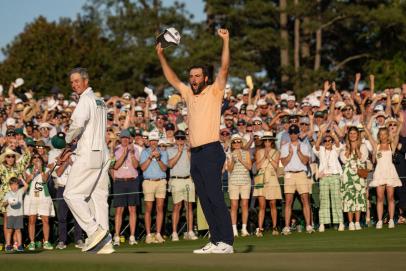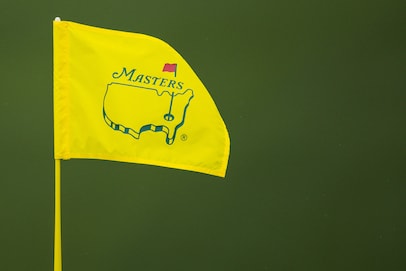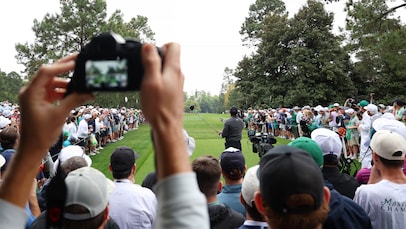When my editors had the idea of writing about the trend of men getting vasectomies around the Masters, there was an initial suggestion—I’m almost positive it was a joke—that it should be a first-person immersive piece. As in, “Hey Shane, go get a vasectomy for the story.”
“Ha, ha!” I replied. “What if, instead, I spoke with an expert and did not, personally, have my vas deferens cut and tied?”
“You’re fired if you don’t get a vasectomy,” they replied.
Just kidding! They didn’t say that last part. Perhaps envisioning future legal or HR complications, they agreed that in lieu of becoming sterilized for journalism, I could have a conversation with a doctor.
On that front, I struck gold. Dr. Edward Rampersaud, urologic oncologist at Triangle Urology Associates in Durham, N.C., performs as many as five vasectomies per week, though as someone who also treats cancer and other major issues, they count as one of “small things” he does … no offense, fellas. Even better, he’s a golf nut who has achieved the dream of converting his two children to the game (as you’ll see, they are much better than him). What follows is our interview, where we cover everything I could think to ask about the confluence of the surgical procedure that is the most effective method of birth control outside of abstinence and … the Masters.
(The interview has been edited for length and clarity.)
Golf Digest: Dr. Rampersaud, hello. Let’s start with the most important stuff. Tell me about your golf game.

Dr. Rampersaud: I’m just your regular, run of the mill 7 to 12 handicap that started playing golf while I was in medical school at Duke. I fell in love with the game there and realized that if I had learned to play golf as a kid, it would’ve been so much easier, especially in terms of understanding the golf swing. I was like “man, if I could have learned to walk and swing a golf club at the same time, this would make a whole lot more sense.”
GD: I feel your pain on that, believe me. It sounds like you took that lesson to heart with your own kids.
Dr. Rampersaud: When I got married, I told my wife, whenever we have kids, we have to make them love the game, because my dream was to take family golf vacations. And we got lucky, we did not make them hate it.
GD: They can play?
Dr. Rampersaud: My daughter is heading to Indiana to play in August, and my son just broke the top 50 in America for his graduation year.
GD: Incredible. OK, begrudgingly, onto the medical stuff. [Note: We actually talked about golf for about 15 minutes, but I think including it would incur the wrath of my editors, so let’s pretend we just moved on.] What’s your medical background?
Dr. Rampersaud: I grew up in Greenville, N.C., did my undergrad at UNC, med school at Duke, then I did my residency at Duke in urology, did a fellowship in oncology at UCLA, came back to Duke on faculty for about 10 years, and now I work in private practice in Durham at Triangle Urology Associates.
GD: So, as it pertains to vasectomies, is it true that they spike before the Masters? Please say yes, otherwise my story is screwed.
Dr. Rampersaud: This is definitely a period of time that people want to have them done more frequently, yes. It was originally propagated as a kind of men’s health initiative, as in, hey, the Final Four would be a great week to do it because you’re going to be sitting on the couch anyway, and you have 48 to 72 hours after the vasectomy where we ask you to sit still and not do very much vigorous activity.
GD: And why is that?
Dr. Rampersaud: The reason is, you can have swelling, you have bleeding, and it happens in a part of the body where it is apt to swell and wants to collect the hematoma and cause a complication. So you’re going to sit on the couch, your best friend is going to be a bag of frozen peas that you keep refreezing, and that helps with the swelling because a vasectomy occurs in a dependent location. When we say dependent, we mean gravity dependent. So we don’t want you on a bike, we don’t want you going to the gym, going for a run, we want you to be as sedate as reasonable.
GD: It’s interesting to me that a health initiative, a sort of marketing campaign, led the way for this idea of getting one before March Madness or the Masters. I don’t think I knew that.
Dr. Rampersaud: Yeah. Somebody had a great idea, and I honestly don’t know where it originated. Even during my training 15 years ago, it was the most common time of the year for people to have vasectomies. It was advertised on television for a period of time, and other periodicals and media, “hey, here’s a good time for you to have your vasectomy.” And it’s important to note that this is an elective procedure, so you can choose your time. I always tell people to pick a Thursday or Friday before a weekend when you don’t have much to do. If you have a tumor growing inside you, I tell you when that’s going to happen, and it’s going to happen as soon as possible, but when you’re coming for a vasectomy, you tell me when it’s going to happen.
So the Final Four and the Masters occur in the same week every year, and so it ends up that a lot of men pick one or the other. A lot of times, men ask their friends where they got it done, how it was and when they did it, so that’s part of it, too, you hear from your buddy he had it done before the Masters, so you do it too. I get it, it’s my favorite sports week of the year for sure. I’m getting ready here to watch everything on the Masters, and in fact, I just got back from San Antonio for the Final Four.
GD: I’m a Duke fan. Let’s not talk about that. Does your practice advertise vasectomies specially at this time of year? Any discounts?
Dr. Rampersaud: No. That sounds like a good marketing tool, I guess, but at the end of the day our practice doesn’t revolve around the performance of vasectomies. They’re a thing we do, probably 15 to 20 times a week as a practice, but we take care of everything urological.
More Masters Coverage  FAQ Masters 101: Answering the most frequently asked questions about 2025’s first major
FAQ Masters 101: Answering the most frequently asked questions about 2025’s first major  Payday at Augusta Masters 2025: Here’s the prize money payout for each golfer at Augusta National
Payday at Augusta Masters 2025: Here’s the prize money payout for each golfer at Augusta National  viewer’s guide How to watch the 2025 Masters (with extra weekend coverage!)
viewer’s guide How to watch the 2025 Masters (with extra weekend coverage!)
GD: How long are you actually operating for a vasectomy?
Dr. Rampersaud: It takes about 20 to 30 minutes.
GD: What’s something a lot of people don’t know about them?
Dr. Rampersaud: The tube that we operate on is about 20 centimeters long, and there are hundreds of millions of sperm in that tube, and we take about a centimeter segment of it next to either testicle. So there’s a period of time that you have to empty that tube out. It’s typically 30 to 40 ejaculations, and you don’t actually test the effectiveness of the operation until that time. At that point, we have a lab we send them to, so I think every urologist tells the person they performed the vasectomy on, you’re not sterile when we do the actual procedure, you’re sterile when you’ve been tested and you and I talk about it.
The other thing is that to reverse a vasectomy, which around one in 100 people want to do, only has around a 50- to 70-percent success rate, and has to be done by specialists at a center who are few and far between. So it’s not a slam dunk to reverse it, and the words we use with our patients is that it’s meant to be permanent.
GD: Fascinating. OK, before I let you go, do you have any other stories at all about this confluence of golf and vasectomies?
Dr. Rampersaud: I don’t know how you can use this.
GD: Try me.
Dr. Rampersaud: So very notoriously and famously, a surgeon—he’s dead now, so you don’t have to worry about him being upset or embarrassed—performed his own vasectomy. OK? And he was also serving in the army reserve. And he decided he was going to do it on the weekend that began the two-week period that he had to serve. So he did it. He did it himself, and then decided that he was going to go play golf at the army base where he was reporting. Which is anathema and counter to everything we would ever tell anybody, right?
And again, I don’t know how you’re going to write this, but his scrotum just blew up like a basketball. It filled up with blood while he was playing. And he could not continue the round, and he had to go to the operating room, go to sleep, be intubated, and that had to evacuate a liter of blood from the scrotum. All because he didn’t follow the instructions he would give anybody else.
GD: WHAT. Is that a true story?
Dr. Rampersaud: That’s a very true story, and in fact that person was famous at the time, in surgical terms.
GD: I don’t know what to say. But if I ever get a vasectomy, I am officially scared straight. Who’s your Masters pick?
Dr. Rampersaud: Ludvig. We model my son’s swing off of him because it is the most beautiful blend of strength and efficiency I’ve seen since Adam Scott. And I love his demeanor on the course. He’s a baller.
Masters 101: Answering all your frequently asked questions
How to watch the 2025 Masters
Power Rankings: Every player in the Masters field, ranked
50 defining Masters Moments, ranked
The most memorable Rules issues in Masters history
Before and after photos of Augusta National’s tree loss from Hurricane Helene
Every course change ever made at Augusta National
A brief history of Masters prize money payouts
15 people who ended up in the Masters penalty box
The Champions Dinner Tell-All, from those inside the room
When Lee Elder desegregated the Masters
This article was originally published on golfdigest.com
